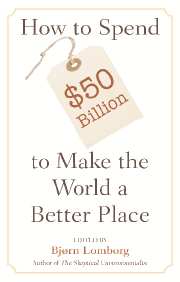Book contents
- Frontmatter
- Contents
- Contributors
- Introduction
- 1 Meeting the Challenge of Global Warming
- CLIMATE CHANGE – OPPONENTS' VIEWS
- 2 Communicable Diseases
- COMMUNICABLE DISEASES – OPPONENTS' VIEWS
- 3 The Challenge of Reducing the Global Incidence of Civil War
- THE CHALLENGE OF CONFLICTS – OPPONENTS' VIEWS
- 4 Toward a New Consensus for Addressing the Global Challenge of the Lack of Education
- THE CHALLENGE OF LACK OF EDUCATION – OPPONENTS' VIEWS
- 5 The Challenge of Poor Governance and Corruption
- THE CHALLENGE OF POOR GOVERNANCE AND CORRUPTION – OPPONENTS' VIEWS
- 6 Hunger and Malnutrition
- HUNGER AND MALNUTRITION – OPPONENTS' VIEWS
- 7 Population and Migration
- POPULATION: MIGRATION – OPPONENTS' VIEWS
- 8 The Water Challenge
- THE WATER CHALLENGE – OPPONENTS' VIEWS
- 9 Subsidies and Trade Barriers
- SUBSIDIES AND TRADE BARRIERS – OPPONENTS' VIEWS
- Expert Panel Ranking
- Index
COMMUNICABLE DISEASES – OPPONENTS' VIEWS
Published online by Cambridge University Press: 27 July 2009
- Frontmatter
- Contents
- Contributors
- Introduction
- 1 Meeting the Challenge of Global Warming
- CLIMATE CHANGE – OPPONENTS' VIEWS
- 2 Communicable Diseases
- COMMUNICABLE DISEASES – OPPONENTS' VIEWS
- 3 The Challenge of Reducing the Global Incidence of Civil War
- THE CHALLENGE OF CONFLICTS – OPPONENTS' VIEWS
- 4 Toward a New Consensus for Addressing the Global Challenge of the Lack of Education
- THE CHALLENGE OF LACK OF EDUCATION – OPPONENTS' VIEWS
- 5 The Challenge of Poor Governance and Corruption
- THE CHALLENGE OF POOR GOVERNANCE AND CORRUPTION – OPPONENTS' VIEWS
- 6 Hunger and Malnutrition
- HUNGER AND MALNUTRITION – OPPONENTS' VIEWS
- 7 Population and Migration
- POPULATION: MIGRATION – OPPONENTS' VIEWS
- 8 The Water Challenge
- THE WATER CHALLENGE – OPPONENTS' VIEWS
- 9 Subsidies and Trade Barriers
- SUBSIDIES AND TRADE BARRIERS – OPPONENTS' VIEWS
- Expert Panel Ranking
- Index
Summary
In their challenge paper, Anne Mills and Sam Shillcutt make a compelling case for strong international efforts to tackle the problem of communicable disease. Their opponents have now made further significant contributions to the debate: Jacques van der Gaag argues for some more radical thinking in the area, and David Evans looks more at the detailed reasoning behind the proposals.
Van der Gaag argues that effectively meeting the challenge requires more than putting money into conventional schemes, often based on best-case data from controlled experiments. Putting them into effect on a large scale is often far more difficult and rarely delivers the same benefits. When it comes to delivery methods, donors are often content with the status quo, and governments may lack the political will to take proper action.
In the case of malaria, he fully agrees with the need to tackle the disease and the benefits of doing so. However, although cost effective interventions exist theoretically, in practice delivery mechanisms are woefully inadequate. Despite occasional success stories, as in KwaZulu Natal, the international Roll Back Malaria program has succeeded only in doubling expenditures with little impact on the burden of disease. One reason for this may be the complete reliance on public healthcare infrastructure.
HIV/AIDS is arguably an even greater problem, with 15,000 new cases each week and little progress being made to treat the approximately 40 million existing cases. Recent models predict economic collapse in badly affected countries unless immediate and far-reaching action is taken.
- Type
- Chapter
- Information
- Publisher: Cambridge University PressPrint publication year: 2006

